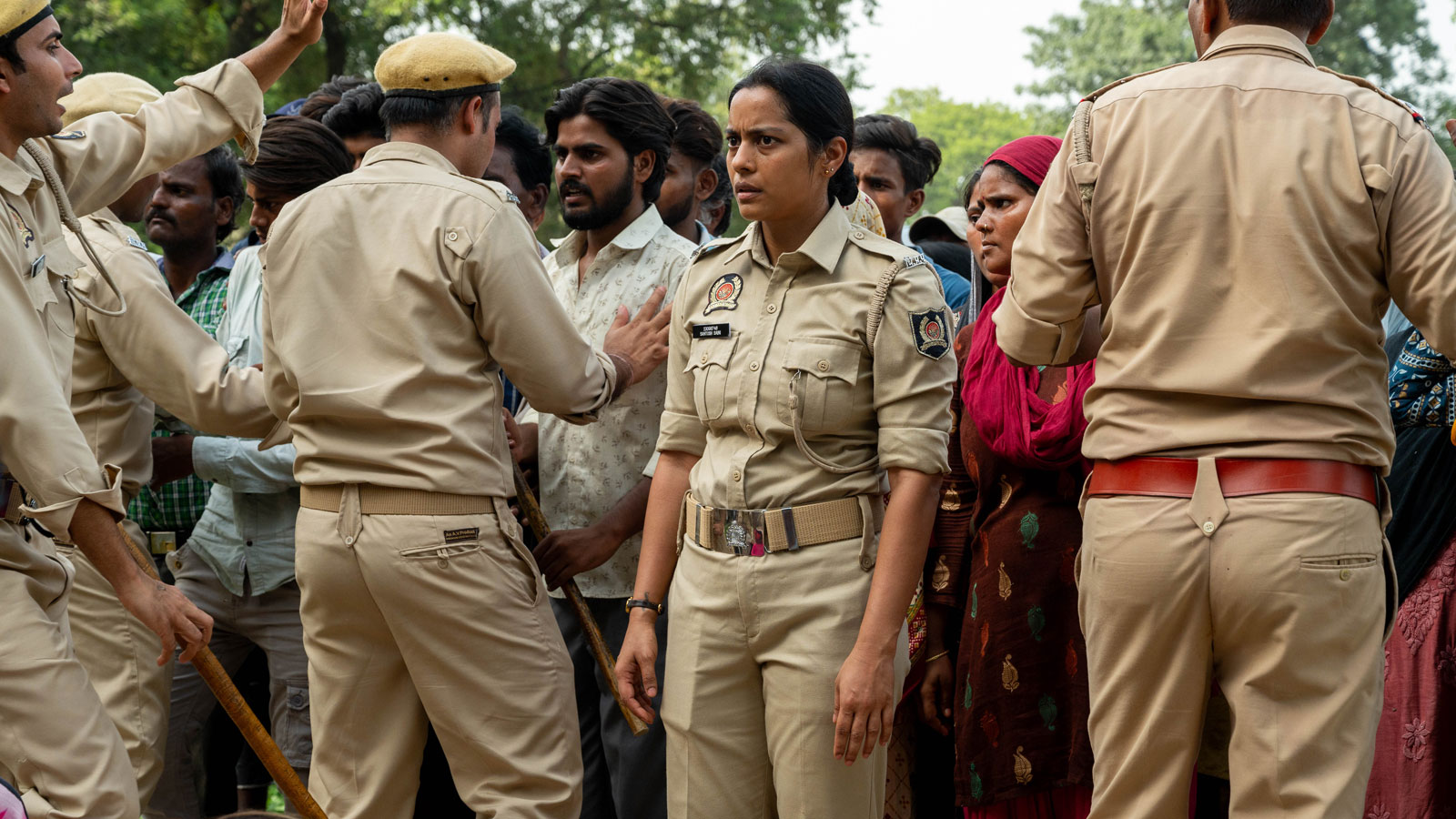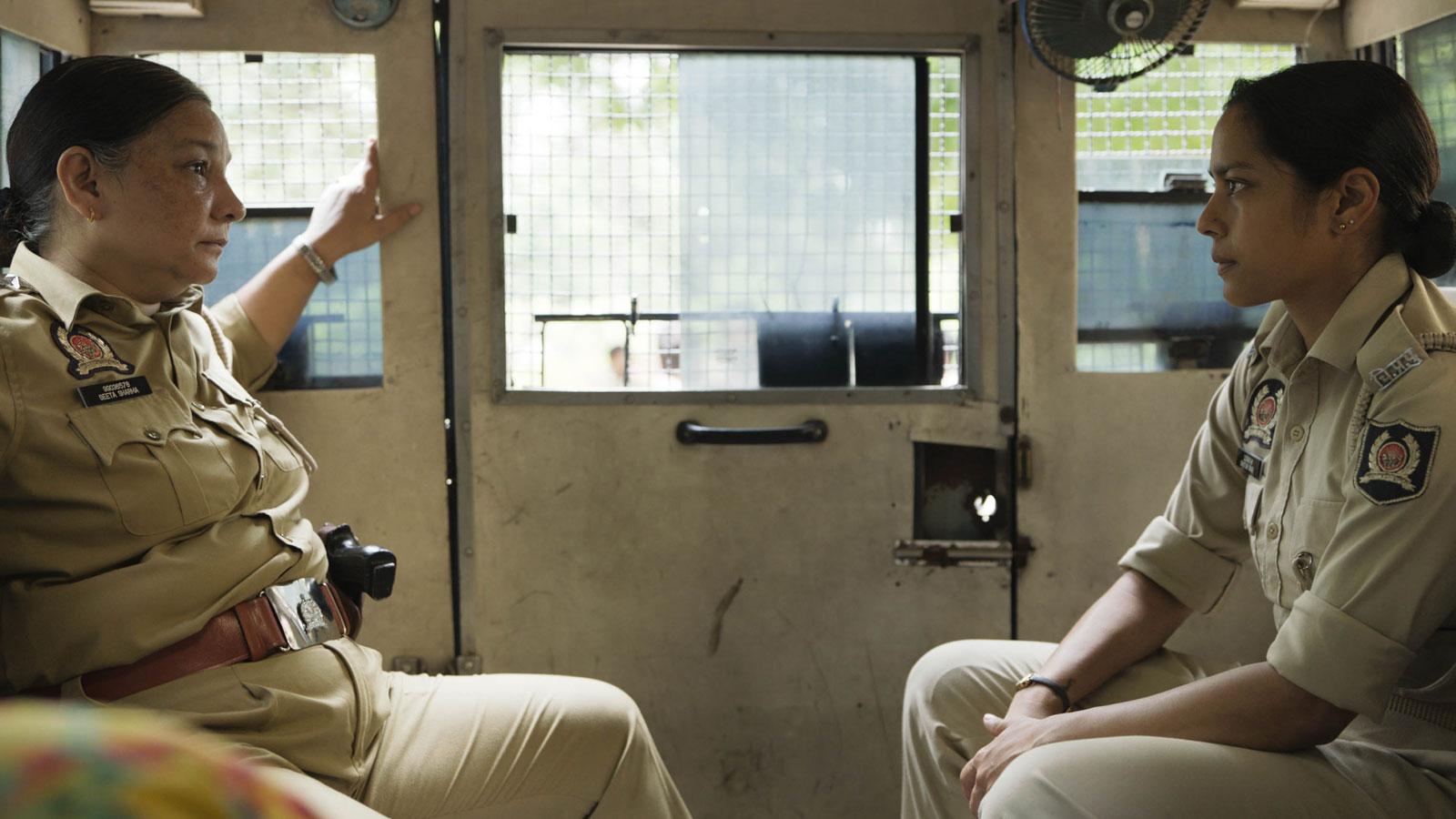Good Cop, Bad Cop: Sandhya Suri’s Santosh

Critics Campus 2024 participant Tara Kenny examines Santosh, which depicts a woman’s attempt to solve a brutal crime while navigating a hostile male-dominated police department – and which shows that good intentions are far from enough to reform a corrupt system.
Early on in British-Indian director Sandhya Suri’s subversive cop film Santosh, the film’s namesake protagonist is fumbling wide-eyed through her first day doing so-called ‘lady police work’ in northern India. Santosh (Shahana Goswami) looks on, bewildered, as a young woman explains that her boyfriend is refusing to marry her, despite the consummation of their relationship. While her disapproving colleagues figure out what to do with the accused lothario, Santosh is tasked with chaperoning the wronged party to the bathroom. Knowing that this is a film that deals with sexual violence, we may well fear the worst when she returns from fetching the keys to find the girl gone. But when Santosh locates her charge through a crack in a closed door, she’s the one inflicting force; male officers are restraining her lover while she pummels him across the head. This is our first, foreboding glimpse of the secret, unofficial machinations of the Indian criminal justice system as depicted in the film. Santosh lulls the viewer into a gentle stupor before pulling the rug out from under the police procedural genre, upending the comforting falsehood that police officers spend their days holding evil actors to account for serious crimes.
Suri’s documentary films – I for India (2005) and Around India With a Movie Camera (2018) – use archival footage and home movies to interrogate the kaleidoscopic relationship between Britain and India, from the turmoil of her doctor father’s migration to suburban England in the 1960s to the exoticising lens of early British expat families in pre-independence India. Her short film The Field (2018), however, saw Suri abandon the British-Indian diasporic perspective and documentary format to examine Indian life on its own terms, through the fictional story of an overworked mother and cornfield labourer who risks safety for passion. Santosh, the director’s first narrative feature, is a continuation of this turn to interrogating Indian society through the fictionalised experiences of a central woman in turmoil.
While originally conceptualising the film as a documentary about violence against women, Suri found another way in after becoming fascinated by a photograph of a female officer restraining outraged women protesting the shocking gang rape and murder of a young woman on a bus in Delhi in 2012. Inspired by her subsequent research into India’s women officers, Santosh follows Santosh Saini, a grieving widow who uses a peculiar government program to inherit her slain husband’s position as a constable after he’s killed on the job.
Initially, Constable Saini spends her days adjudicating spats between unmarried couples caught hooking up. But the stakes escalate rapidly when she’s paired with Geeta Sharma, a formidable, older woman constable played by Sunita Rajwar, whose swaggering demeanour and disaffected cigarette smoking come as close as is humanly possible to making policing look cool. But when Devika Pippal, a teenage girl from a Dalit family of day labourers, is found raped and murdered at the bottom of a village well, Santosh and Geeta’s male colleagues are shockingly unfazed; Dalits are considered ‘untouchable’ within India’s caste system. Accordingly, the male officers mock Devika’s father for being illiterate when he comes to the station to report her missing, and joke that she probably just “went to take a shit in the field”; while later, when she turns up dead, they refuse to handle her body for fear of phantom contamination.

Santosh
Knowing what it’s like to be discarded, Santosh feels a particular affinity with the victim: after her husband’s death, her parents and in-laws bickered over who would support her, ultimately casting her aside like a broken dish. In attempting to make things right for Devika’s stricken family and community by vowing to find the killer and hold him to account, Santosh is affirming both the fallen victim and her own value in a world eager to crush them. As we watch Santosh and Geeta connect the dots to a Muslim admirer named Saleem (Arbaz Khan) and begin to close in on him, the propulsive and tense energy mirrors that of a conventional cop show, with the inevitable resolution of justice seemingly within reach.
While iconic Western police procedurals such as Law & Order: Special Victims Unit, The Bill and Blue Heelers often portray law enforcement as tortured but ultimately virtuous players, classic Bollywood cops are strong men committed to catching the bad guys, even if it means acting outside of the law. The male officers in Santosh share their screen counterparts’ willingness to flout the rules, but none of their enthusiasm for solving crimes, preferring to spend their time on the clock watching Bollywood movies and patronising anyone of a lower station who needs their help. In their dogged pursuit of Devika’s killer, Santosh and Geeta offer a counterpoint to their colleagues’ cruel indifference. Western viewers used to seeing Indian women confined to the domestic sphere may be impressed by the pair’s girl-bossery. But those of the ‘all cops are bastards’ persuasion already know that merely dropping women or minorities into broken systems without further structural change is not enough to fix the rot. Where violence is utilised in Santosh, it’s sparing and unflinching, highlighting the sometimes mundane, everyday nature of institutional evils.
As the film progresses, the tension of Geeta and Santosh’s pursuit of Saleem gives way to Santosh’s internal conflicts as she struggles to square her desire to do the right thing with the costs of her newfound power and freedom in the world. This journey is explored both explicitly and symbolically – for example, through Santosh’s changing relationship with food. Early on, she must sing for her supper, as the male cops exclude her from their collegial meals and patronisingly suggest that she help the housekeeper prepare their food. In one scene, a plain-clothed Santosh’s solo work lunch is upended by the silent but menacing presence of a sweaty male patron eyeing her from across the room. Initially, she attempts to avoid his unrelenting gaze, but then grows increasingly frantic, shovelling lentils and curry into her mouth like she’s participating in a morose one-woman eating competition. As the background chatter and clinking of plates and cutlery reaches a crescendo, Santosh locks eyes with her silent tormentor, staring at him squarely in the face as she purges up her meal – a squeamish show that really gives him something to look at.
Whether surveilled or ignored by men, Santosh is denied even the simple pleasure of a satisfying meal. Later, Geeta and the other officers ply Santosh with treats – from frothy, saccharine cakes to oily samosas – and her increased gastronomic pleasure tracks with her assimilation into their world, in which one can simply take what they want, on and off the plate. Given the film’s narrative density, such finer details are easily overlooked on a first watch.
Santosh manages to confront numerous pressing social issues, from sexual violence to police corruption and the plight of Muslims and Dalits within India’s enduring caste system, without being overly didactic or gratuitously violent. Where classic police procedurals simplistically sift good from evil, Santosh lays bare how even the most naively well-intentioned among us can come to accept the illusion of righteousness over the real thing, if it serves our interests. By the film’s end, Santosh has graduated from peeking in at secret police business from the outside to having the doors thrown open to welcome her in, goading the audience to consider their own quiet complicity in the myriad injustices required to maintain the veneer of social order.